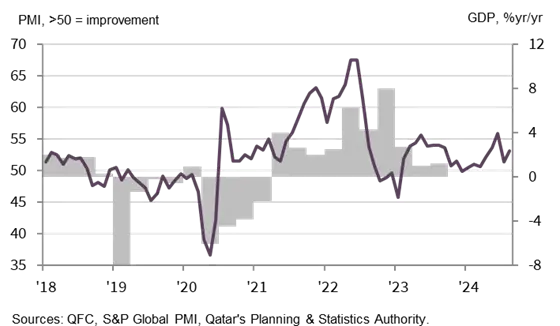PHOTO
- Record wage increases drive overall cost inflation to four-year high
- Marked improvement in year-ahead outlook
Doha, Qatar – The latest Purchasing Managers’ Index™ (PMI®) survey data from Qatar Financial Centre (QFC) compiled by S&P Global signalled an all-round improvement in business conditions in Qatar's non-energy private sector in August. Demand for goods and services strengthened, driving a near-record increase in employment and another solid expansion in output. Firms continued to deplete outstanding business, and average wages rose at the fastest rate on record. Overall cost pressures were the highest in four years, while charges for goods and services fell slightly. Finally, the 12-month outlook improved notably.
The Qatar PMI indices are compiled from survey responses from a panel of around 450 private sector companies. The panel covers the manufacturing, construction, wholesale, retail, and services sectors, and reflects the structure of the non-energy economy according to official national accounts data.
The headline Qatar Financial Centre PMI is a composite single-figure indicator of non-energy private sector performance. It is derived from indicators for new orders, output, employment, suppliers’ delivery times and stocks of purchases.
The PMI rose to 53.1 in August, from 51.3 in July, signalling a stronger overall improvement in business conditions in the non-energy private sector economy. It was also above the long-run trend level of 52.3 (since April 2017).
The employment component provided the largest boost to August’s headline figure. Private sector jobs in Qatar rose strongly in August, reversing July's slight decline. The workforce growth rate was the second-fastest on record, just shy of the peak set in January 2019.
The boost to jobs was accompanied by record wage pressures during the month, as the seasonally adjusted Staff Costs Index rose to a new high of 55.7. Non-staff cost pressures also intensified in August, with purchase price inflation at a 15-month high. Overall input price inflation hit a four-year high. In contrast, prices charged for goods and services fell in the latest period.
Recruitment was influenced by a strengthening demand for Qatari non-energy goods and services. The level of incoming new orders expanded for the eighteenth time in 19 months, and at a strong rate that outperformed the long-run survey trend.
The faster increase in new business in August supported another robust expansion in total activity. Output has risen continuously for over four years except for two brief pauses in January and December last year. While accepting new contracts, companies continued to reduce the volume of outstanding orders, albeit at the slowest rate in the current seven-month sequence of backlog depletion.
Confidence regarding the next 12 months strengthened notably in August, to the highest since March 2023. Positive sales forecasts were linked to government economic development policies, tourism, a rising expatriate population, construction and real estate projects, and Qatar's attractiveness to international investors.
New project starts meant that demand for inputs rose in August, as purchasing activity increased for the sixth successive month. Despite this, suppliers’ lead times improved to the greatest extent since December 2022. Input stocks declined for the sixth time in 2024 so far and at the fastest rate since November 2022.
QFC Qatar PMI vs. GDP


Financial Services
Fastest rise in new business for two years
- Demand for financial services accelerates in August
- Sharpest increase in employment for five years
- Year-ahead outlook improves
Qatari financial companies recorded booming demand for their services in August. The seasonally adjusted Financial Services New Business Index rose sharply to 62.9, from 57.2 in July, signalling a rapid improvement in demand conditions with the fastest growth since August 2022. This led to a faster rise in total activity (58.6).
Companies were also increasingly optimistic regarding the 12-month outlook, with sentiment at the highest level since May 2023. There was also a notable boost to employment growth, which was the strongest in five years (56.4).
In terms of prices, average charges set by financial services companies fell for the first time in four months. Meanwhile, average input prices rose the most since July 2020.
Comment
Yousuf Mohamed Al-Jaida, Chief Executive Officer, QFC Authority:
"The PMI resumed its recent upward trajectory in August, mainly reflecting a surge in employment and stronger inflows in new business. The increase in jobs was the second-fastest in the survey history, while demand growth was driven by the trade and services segments of the non-energy economy. Financial services continued to lead the way with the sharpest rise in new business in two years.
"Output growth remained in line with the strong long-run survey trend, while the 12-month outlook rose to the highest since March 2023.
"As well as recruiting more staff, companies raised wages and salaries at the fastest rate on record in August. This, combined with stronger purchase price inflation, took the overall input price inflation to a four-year high."
-Ends-
ABOUT THE QATAR FINANCIAL CENTRE
The Qatar Financial Centre (QFC) is an onshore business and financial centre located in Doha, providing an excellent platform for firms to do business in Qatar and the region. The QFC offers its own legal, regulatory, tax and business environment, which allows up to 100% foreign ownership, 100% repatriation of profits, and charges a competitive rate of 10% corporate tax on locally sourced profits.
The QFC welcomes a broad range of financial and non-financial services firms.
For more information about the permitted activities and the benefits of setting up in the QFC, please visit qfc.qa
@QFCAuthority | #QFCMeansBusiness@QFCAuthority | #QFCMeansBusiness
MEDIA CONTACTS
QFC: Rasha Kamaleddine, Marketing & Corporate Communications Department, r.kamaleddine@qfc.qa
ENQUIRIES ABOUT THE REPORT
QFC: qatarpmi@qfc.qa
ABOUT S&P GLOBAL
S&P Global (NYSE: SPGI) S&P Global provides essential intelligence. We enable governments, businesses and individuals with the right data, expertise, and connected technology so that they can make decisions with conviction. From helping our customers assess new investments to guiding them through ESG and energy transition across supply chains, we unlock new opportunities, solve challenges, and accelerate progress for the world.
We are widely sought after by many of the world’s leading organizations to provide credit ratings, benchmarks, analytics and workflow solutions in the global capital, commodity, and automotive markets. With every one of our offerings, we help the world’s leading organizations plan for tomorrow, today. www.spglobal.com.
ABOUT PMI
Purchasing Managers’ Index™ (PMI®) surveys are now available for over 40 countries and for key regions including the Eurozone. They are the most closely watched business surveys in the world, favoured by central banks, financial markets and business decision makers for their ability to provide up-to-date, accurate and often unique monthly indicators of economic trends.
www.spglobal.com/marketintelligence/en/mi/products/pmi.html
METHODOLOGY
The Qatar Financial Centre PMI® is compiled by S&P Global from responses to questionnaires sent to purchasing managers in a panel of around 450 private sector companies. The panel is stratified by detailed sector and company workforce size, based on contributions to GDP. The sectors covered by the survey include manufacturing, construction, wholesale, retail, and services.
Survey responses are collected in the second half of each month and indicate the direction of change compared to the previous month. A diffusion index is calculated for each survey variable. The index is the sum of the percentage of ‘higher’ responses and half the percentage of ‘unchanged’ responses. The indices vary between 0 and 100, with a reading above 50 indicating an overall increase compared to the previous month, and below 50 an overall decrease. The indices are then seasonally adjusted.
The headline figure is the Purchasing Managers’ Index™ (PMI). The PMI is a weighted average of the following five indices: New Orders (30%), Output (25%), Employment (20%), Suppliers’ Delivery Times (15%) and Stocks of Purchases (10%). For the PMI calculation the Suppliers’ Delivery Times Index is inverted so that it moves in a comparable direction to the other indices.
Underlying survey data are not revised after publication, but seasonal adjustment factors may be revised from time to time as appropriate which will affect the seasonally adjusted data series.
Data were collected 12-22 August 2024.
For further information on the PMI survey methodology, please contact economics@spglobal.com.
CONTACT
S&P Global: Sabrina Mayeen | E. Sabrina.mayeen@spglobal.com



















